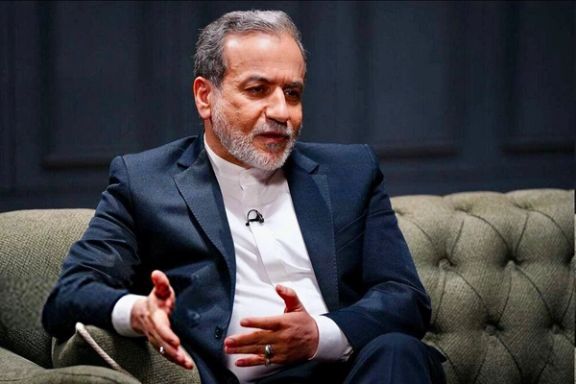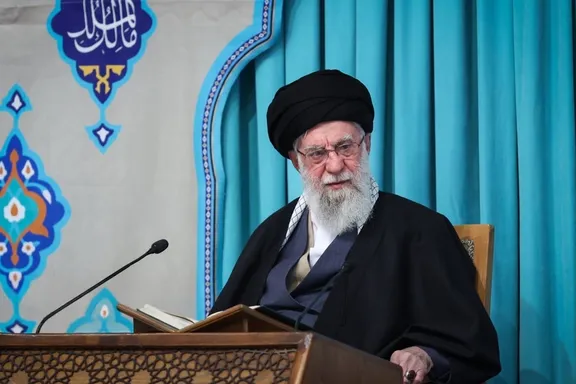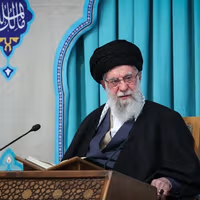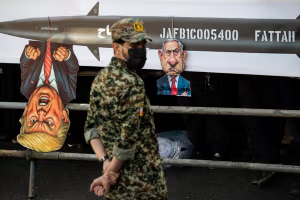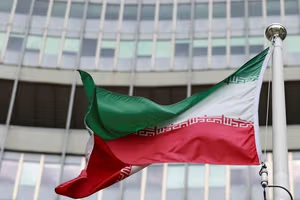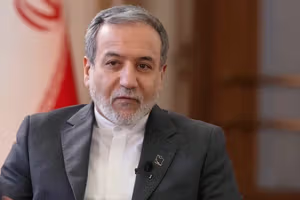“Even the latest message from the US was that they are ready to close the snapback sanctions issue and the Security Council file, but in exchange for things that are absolutely unacceptable,” Araghchi said in an interview with Khabar Online in Tehran published on YouTube.
Araghchi said President Donald Trump’s letter to Supreme Leader Ali Khamenei shortly before the war explicitly offered two options: war and bloodshed, or direct negotiations to completely eliminate Iran’s nuclear enrichment and ballistic missile programs.
“When one side has maximalist demands and says from the beginning ‘accept them and then come negotiate’ – the same things they couldn’t achieve through military confrontation and now want through negotiation – they say ‘come negotiate’ but these results must come out of it,” he said.
Araghchi repeatedly accused the US of demanding the same maximalist outcomes through talks that it failed to achieve militarily, describing the approach as dictation rather than genuine give-and-take.
“Now our conclusion is not that America seeks real negotiation. They seek to achieve demands that are not only undesirable for us but harmful to our interests. Especially after this war, we cannot negotiate about our defense capabilities. We cannot negotiate to reduce missile range – there is no greater betrayal,” he added.
Iran’s top security official Ali Larijani said in September Washington has demanded Iran halt all uranium enrichment and curb its missile program.
“On enrichment – we spent 20 years, endured war and time, and before and during the war lost nuclear scientists. Now come and say zero enrichment? No one would accept such a thing," Araghchi said.
‘Witkoff could not sell it’
Araghchi said indirect Oman talks reached mutually acceptable solutions three times, but Trump’s envoy Steve Witkoff could not convince the administration in Washington.
“The thinking Trump has – and early in his term he said peace through strength, through force. Previous administrations said peace through diplomacy, but he said diplomacy through force,” he added.
Iran and the US held 5 rounds of indirect talks in Oman in April and May. The 6th round was scheduled but was cancelled due to Israel's surprise attack on Iran in June.
The strikes killed senior nuclear scientists along with hundreds of military personnel and civilians. Iranian counterattacks killed 32 Israeli civilians and an off-duty soldier.
Joining the conflict, the United States attacked three Iranian nuclear sites and Iran responded with missile attacks on a US airbase in Qatar before US President Donald Trump enforced a ceasefire.
“I repeatedly said you can hit buildings and facilities but not knowledge and will. That’s why he (Trump) says come negotiate – says come sign that you won’t enrich,” Araghchi said. “Their goals went beyond nuclear attack. But with our resistance they didn’t achieve them and won’t in future.”
‘Dictation not negotiation’
Asked what happened in New York alongside the UN General Assembly – where a meeting was reportedly planned but did not take place – Araghchi said it was due to White House preconditions.
“Our mediator was Rafael Grossi (IAEA Director General) and he was very eager to play a positive role. He told us Mr. Witkoff is very satisfied provided we negotiate directly – that Witkoff, I and Mr Grossi sit and negotiate,” he said.
“We were on the way to the airport when Mr. Witkoff messaged: my mandate for negotiation is ‘first accept this, then come negotiate; otherwise I won’t come to that meeting’. I told him everyone negotiates first then agrees – you want me to agree then negotiate? I used the phrase and said this is dictation,” Araghchi added.
Iranian government spokeswoman Fatemeh Mohajerani said last month that Iran had proposed a meeting in New York, but the US side did not attend due to preconditions.
“In New York again Grossi and the Europeans tried to make it happen and Witkoff said he would come, but my mandate is the same – if you accept I come. We said no,” Araghchi said.
'Dispute with IAEA'
Asked what will happen in Iran’s relations with the International Atomic Energy Agency (IAEA), Araghchi said there is a serious dispute over inspecting attacked sites.
“We are still a Non-Proliferation Treaty (NPT) member. We don’t say we won’t cooperate with the Agency. We currently still have cooperation with the Agency but regarding places not attacked, like Bushehr nuclear power plant,” Araghchi said.
“The Agency must clarify how inspection of a facility that was attacked works. Because there is no precedent. That they attack and then the Agency reports the extent of damage – that can’t be. Plus it’s dangerous: radiation danger and unexploded bombs danger exist,” he added.
The interview was conducted hours before the vote at the IAEA Board of Governors, which adopted a Western-backed resolution demanding greater transparency from Tehran.
“The resolution they raised against us at the Agency is very bad. But if passed it makes work with the Agency harder. Unfortunately it’s the West pushing the hard path, not us,” he said.
The resolution, adopted on Thursday and submitted by the United States, Britain, France and Germany, urges Iran to give the Agency access and information about its nuclear program.
In a separate interview with The Economist published on Thursday, Araghchi said any negotiations should be in a balanced setting. “We are ready to go for a deal, but for a fair and balanced deal, not a one-sided deal.”
